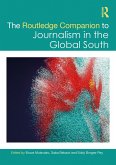In recent decades, Mexico has been one of the most dangerous democracies for journalists. Their coverage of the war on drugs, abuses of power, and human rights violations has led to harassment, threats, and violence by powerful cartels and corrupt officials. This book provides a ground-level view of how Mexican journalists have navigated this perilous environment, offering insight into how they protect themselves while reporting on the most critical and sensitive subjects.
Based on in-depth interviews with reporters, editors, activists, and officials, Mexico's Resilient Journalists examines the strategies that media workers have employed in pursuit of both personal safety and the public interest. Julieta Brambila argues that Mexican journalists have developed innovative forms of resilience, highlighting their power and agency amid violence, censorship, and intimidation. She considers how journalists have banded together to develop coping mechanisms, protect each other, and raise public awareness. These resilient newsmakers have adapted to adversity by redefining their professional values and practices, rethinking their surroundings, and reassessing their role. Brambila also evaluates how various media organizations have learned from incidents of violence and changed their policies to better protect their reporters. Shedding new light on defense of the freedom of the press in Mexico, this book offers crucial lessons for other countries seeing a rise in threats to independent journalism.
Based on in-depth interviews with reporters, editors, activists, and officials, Mexico's Resilient Journalists examines the strategies that media workers have employed in pursuit of both personal safety and the public interest. Julieta Brambila argues that Mexican journalists have developed innovative forms of resilience, highlighting their power and agency amid violence, censorship, and intimidation. She considers how journalists have banded together to develop coping mechanisms, protect each other, and raise public awareness. These resilient newsmakers have adapted to adversity by redefining their professional values and practices, rethinking their surroundings, and reassessing their role. Brambila also evaluates how various media organizations have learned from incidents of violence and changed their policies to better protect their reporters. Shedding new light on defense of the freedom of the press in Mexico, this book offers crucial lessons for other countries seeing a rise in threats to independent journalism.
Dieser Download kann aus rechtlichen Gründen nur mit Rechnungsadresse in A, D ausgeliefert werden.









